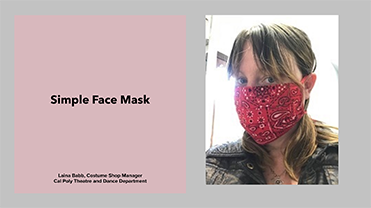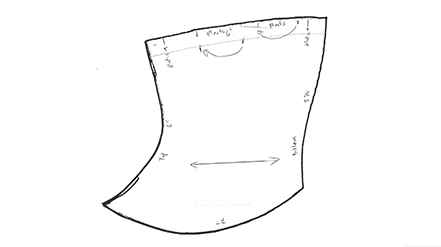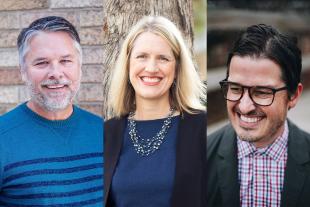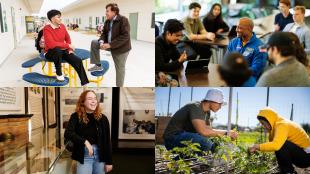'You Can Pay It Forward.' Theatre & Dance Department Creates Patterns for People to Make Their Own Masks
As the coronavirus pandemic spread through the United States, and protective face coverings became the norm, costume shop manager Laina Babb of the Theatre and Dance Department spent days creating accessible patterns that students and alumni can use to fashion their own face masks out of fabric.
“Initially, this was for hospitals but morphed into putting it out there for the community, because of the changing recommendations,” Theatre and Dance department chair Josh Machamer said, referring to the updated CDC guidance encouraging people to wear protective masks in public.

“Making fabric masks alleviates the need for masks that are better suited for hospitals,” Babb said. “It’s a nice way to be creative and be able to do something constructive when we’re all sitting at home figuring out what’s going to come next.”
The patterns are available to students through the department’s Canvas page, which also contains a multitude of resources to help them through the virtual Spring quarter.
“You don’t know how many people are going to make them, but knowing it’s out there for people, that’s part of what our job is,” Machamer said. “We make sure there are resources and they still have a connection to us, whether they’re students, alumni or faculty.”
The two mask patterns are a simpler, pleated mask and a more stylish “duck-bill” mask, which has more space in front of the face and a pocket where people can put a filter.
“This came internally from Cal Poly with Laina’s idea,” Machamer said. “We’re putting our departmental name behind it; we’re putting our expertise behind it and we’re showcasing ways in which we’re adjusting and being flexible in the shift and dynamic for the Spring Quarter.”

Machamer also sent the mask patterns to Theater alumni.
“All of our alumni had to go through the costume construction class, so it’s a great way to harken back to remembering some of those skills. And now they can see the benefits of what they’ve learned in everyday life,” he said. “You don’t necessarily know where these skills will come in handy, but being able to combine the hard skills of knowing how to sew with the aspect of creativity, collaboration, ingenuity and service are attributes of larger transferable skills.”
Babb is also in the process of making about 30 masks for some of San Luis Obispo’s essential city workers.
“This is an opportunity for people to feel like they can take some sort of control in this unknown environment, which is really important,” Machamer said. “It’s not just a hobby, but ultimately essential. You can make a mask not just for yourself, but for friends. You can pay it forward.”




